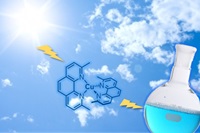In the same section
- Accueil
- EN
- Research
- Research projects
- Fédération Wallonie-Bruxelles
- "Actions de recherche concertées" (ARC)
-
Share this page
Research project "Photoinduced Copper-Catalyzed Reactions" (ARC program)
"Photoinduced Copper-Catalyzed Reactions: New Directions in Copper Catalysis - a Unified Approach to Highly Valuable Building Blocks"

Whether we're talking about developing polymers, new materials or producing drugs, all these scientific fields need to synthesise organic molecules. This requires the support of one of chemistry's oldest fields, organic chemistry. There is thus an increasing need to develop high-performance processes for producing such molecules.
In this context, the Faculty of Science's Organic Chemistry Lab is developing new and highly efficient synthesis methods based on copper catalysis. Using copper has several advantages, including high availability, a fairly low price and low toxicity, opening up a range of possibilities. Yet despite these advantages, copper catalysis has its limits. One of the main drawbacks is that it often requires high temperatures and long reaction times, something not always compatible with complex and sensitive molecules, with the result that a number of processes remain inaccessible.
In response to these major drawbacks, the ARC project conducted by Gwilherm Evano's team intends to combine copper catalysis and photochemistry to develop new better-performing "green" molecular synthesis processes, while at the same time developing reactions that are currently impossible. The challenge is to find the right copper complexes and the right light sources to arrive at a combination allowing the development of optimal processes.
Spokesperson
Gwilherm EvanoOrganic Chemistry Lab
Faculty of Sciences
